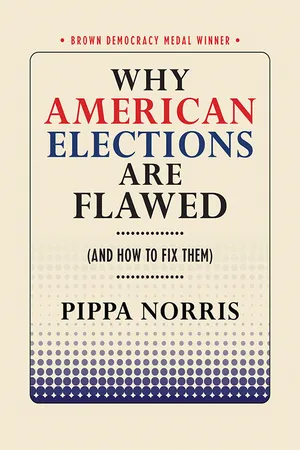
- 58 pages
- English
- ePUB (mobile friendly)
- Available on iOS & Android
Why American Elections Are Flawed (And How to Fix Them)
About this book
The flaws in the American electoral process have become increasingly apparent in recent years. The contemporary tipping point in public awareness occurred during the 2000 election count, and concern deepened due to several major problems observed in the 2016 campaign, worsening party polarization, and corroding public trust in the legitimacy of the outcome.To gather evidence about the quality of elections around the world, in 2012 the Electoral Integrity Project (EIP) was established as an independent research project based at Harvard and Sydney universities. The results show that experts rated American elections as the worst among all Western democracies. Without reform, these problems risk damaging the legitimacy of American elections—further weakening public confidence in political parties, Congress, and the U.S. government, depressing voter turnout, and exacerbating the risks of mass protests.Why American Elections Are Flawed describes several major challenges observed during the 2016 U.S. elections arising from deepening party polarization over basic voting procedures, the serious risks of hacking and weak cyber-security, the consequences of deregulating campaign spending, and lack of professional and impartial electoral management. Pippa Norris outlines the core concept and measure of electoral integrity, the key yardstick used to evaluate free and fair elections. Evidence from expert and mass surveys demonstrate the extent of problems in American elections. She shows how these challenges could be addressed through several practical steps designed to improve electoral procedures and practices. If implemented, the reforms will advance free and fair elections, and liberal democracy, at home and abroad.
Frequently asked questions
- Essential is ideal for learners and professionals who enjoy exploring a wide range of subjects. Access the Essential Library with 800,000+ trusted titles and best-sellers across business, personal growth, and the humanities. Includes unlimited reading time and Standard Read Aloud voice.
- Complete: Perfect for advanced learners and researchers needing full, unrestricted access. Unlock 1.4M+ books across hundreds of subjects, including academic and specialized titles. The Complete Plan also includes advanced features like Premium Read Aloud and Research Assistant.
Please note we cannot support devices running on iOS 13 and Android 7 or earlier. Learn more about using the app.
Information
Notes
Introduction
I. Challenges of Electoral Integrity during the 2016 US Elections
Table of contents
- Introduction
- I: Challenges of Electoral Integrity during the 2016 US Elections
- II: Measuring Electoral Integrity
- III: Comparing Electoral Integrity within and across States
- IV: What Is to Be Done?
- V: Conclusions and Recommendations
- Acknowledgments
- Notes
- About the Author